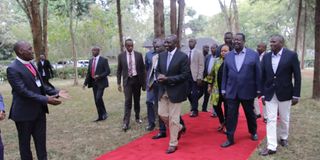Premium
A unique Kenyan fight over President William Ruto

President William Ruto accompanied by other leaders at Sagana State Lodge in Nyeri for a thanksgiving service on August 6, 2023.
President William Ruto is scheduled to visit Kenya’s Western region from August 27. What has followed, from an East African perspective, is uniquely Kenyan. There were reports, as in Daily Nation, that “Leaders split on President Ruto’s visit to Western”. That headline has been repeated in Kenyan media over a hundred times in the last 20 years (if not longer) following an incumbent's visit virtually anywhere beyond 15 kilometres from State House, Nairobi.
You would rarely read a story like that about Uganda President Yoweri Museveni, Tanzania President Samia Suluhu Hassan, or Rwanda President Paul Kagame ahead of their visit up-country. It’s not that the media in those places are shy about reporting it, but because there is hardly any controversy about such presidential visits in these countries. And they tend to be very disciplined affairs.
It's intriguing that the picture is so different in Kenya. And the fact that there is a lot of pre-visit ritual. One of the most puzzling ones is that leaders from the area will first visit the President in Nairobi to talk about his visit; to establish an agenda and the lay of the land. In the case of the Western Kenya visit, the scuffle now is over some eminent persons from the region who were not in that delegation. They were “sidelined”, to use the popular Kenyan description. And without them, nothing serious can be considered to have happened.
Presidential visits
In Kenya’s case, one difference is that such visits tend to be more dramatic than elsewhere in the region. In past presidential visits, a microphone has been forcefully snatched from the hands of what local political forces considered errant speakers.
The most important driver for the do-or-die competition proximity to the visiting head of state on home soil; who shakes his hand when he arrives; who he snubs; who he is seen having a laugh with; and who the big man refers to as “my friend”, is that it offers a bigger electoral dividend in Kenya, and can make political careers.
And if a president is visiting and is hosted for lunch at your house, it is the ultimate coronation. Which all leads to the next question: Why would proximity to the President in your backyard be so politically lucrative?
One of the things I have never gotten used to after so many years, is to hear the occasional threats by politicians against the President stepping in their constituencies or home towns. And, sure enough, presidents have occasionally avoided potentially “hostile” areas in their up-country tours.
There is simply no context for understanding the idea that a president needs some kind of permission or a nod from local politicians or Members of Parliament to visit their area in the rest of East Africa, perhaps with the exception of South Sudan. It’s not just about the power of the presidency, but a deep seated mindset that the national trumps the local. In Uganda if you tried that, President Yoweri Museveni would make you eat his hat twice over.
In Kenya, it happens partly for a good reason; the long-running democratic contest in the country against a powerful presidency, and the power of regional politics, has carved a balance of power over State House in ways that are only evolving elsewhere. But the dynamics that inform this reality are demand driven, and the indications that it has to do with the ferocity of competition in local politics.
The turnover of MPs in Kenya’s Parliament in every election cycle is 70 per cent. You can count the number of MPs who have served at least 15 years consecutively on the fingertips of one hand. This short political lifespan comes, first, from the weaknesses of parties in Kenya, and their ephemeral nature. They are thus unable to impose a party line on candidate selection in the primaries (which might be a good thing if you are a democracy fundamentalist).
Too many aspirants
Secondly, because its elections are more freewheeling and fiercely fought, with so many candidates, too many aspirants go into election day with very slim odds. In this environment, being seen rubbing shoulders with the President is a massive asset that can deliver votes from an electorate looking to send to Nairobi “someone who can work with our president”. The closer you are to the President, the better your prospects. If people are lining up to receive His Excellency, and your head is seen sticking out in the back third row when your rival is in front clasping his hands between his, you are cooked goose.
Interestingly in Kenya, even the Opposition jockey for the privilege. We have seen in the past opposition politicians making the case that they should be elected, because they have the ability to go into State House and negotiate for the people’s rightful share of the national cake – precisely because they are in an opposition stronghold. This premium on presidential proximity, has allowed Kenyan presidents to claw back power that otherwise they had lost in the ebb and flow of democracy warfare.
Mr Onyango-Obbo is a journalist, writer, and curator of the "Wall of Great Africans". Twitter@cobbo3





